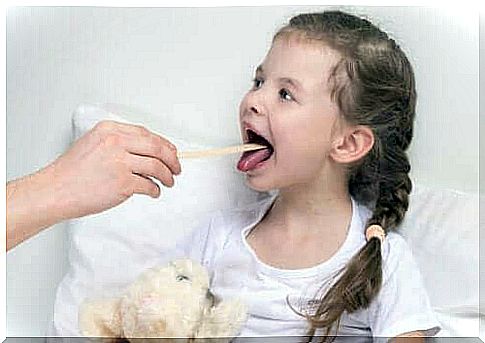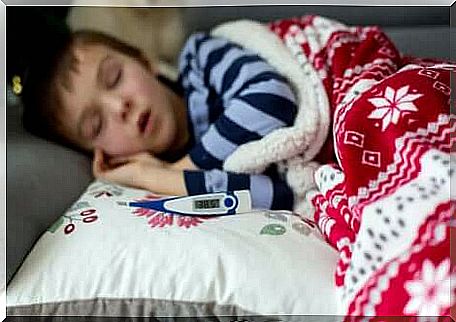Laryngitis In Children: Symptoms And Treatment
It is important to understand the signs of laryngitis in children in order to be able to respond appropriately if necessary. Find out all about it and learn what to do in this article.

Inflammation of the larynx (laryngitis) in children is one of the most common reasons for a visit to the pediatric emergency room. The breathing difficulties associated with this condition can cause parents to worry and even panic, which can lead to an inappropriate response.
There are ways to prevent laryngitis from getting worse in children, thereby reducing the possible complications. Prevention is one of the most important aspects when it comes to avoiding the most common consequences of this condition.
Find out how to proceed in the following article.
What is laryngitis in children?
Laryngitis is a respiratory disease that usually comes on quickly – that is, it starts suddenly and develops quickly. It is an inflammation of the larynx that is usually caused by a viral or bacterial infection.
When a disease is caused by a virus, the drugs available focus on relieving symptoms. This is because the body fights the infection on its own. For this reason, it is important not to self-medicate children. In other words, you should never give your child medication without a doctor’s prescription.
In most cases, laryngitis in children is mild and the best course of action is prevention. Nevertheless, it is important to know which symptoms are of concern and require an emergency service.
Prevention of laryngitis in children

The most important way to reduce the risk of this disease is to maintain preventive habits. Pay attention to the following points:
- Wash your hands Viruses and bacteria are mainly spread through the hands. It is therefore important to continuously train children in hygiene.
- Avoid smoke. Avoid smoking in the home and around children. You need to understand the importance of getting rid of harmful behaviors.
- Make sure you are drinking enough fluids. It is also important to offer your children frequent water to keep the skin hydrated. Pay more attention to this point after engaging in physical activity.
- Increase your consumption of fruits and vegetables. Consumption of these foods boosts the activity of the immune system.
- Avoid contact with sick people. Visiting relatives or friends with children who have any type of illness, especially respiratory problems, is not a good idea. Also, avoid taking them with you to hospital visits.
Symptoms of laryngitis in children
Laryngitis in children can manifest itself in many ways, but the most common are the following:
- To cough. This symptom can be particularly worrying for parents if it is compulsive and does not allow the children to calm down. There are home remedies that can help relieve the cough, such as moisture.
- Hoarseness or aphonia. The inflammation of the vocal cords causes a change in the children’s voice.
- Pain when swallowing. Children may complain of pain when swallowing during the day. This pain worsens when you eat solid foods.
- Difficulty breathing. A small whistling or pulling noise may occur when the child inhales. If it is very pronounced, you can hear this sound without listening carefully. In this case, one should go to the emergency room.
Warning signs and when to go to the hospital
There are certain situations when parents need a certain amount of knowledge in order to be able to act appropriately.
Difficulty breathing

Difficulty breathing is when your child has difficulty breathing. You will notice more intense movements in your chest or abdomen and you may also notice an intercostal retraction – that is, an inward movement of the muscles between the ribs.
In some cases, you will also hear noises when breathing. This is a sign that you should take your child to the hospital straight away for a medical exam.
fever
You only have to regard a fever as a warning sign if it meets certain criteria. For example, if it is above 39 ° C at any time, or above 37.5 ° C for more than 3 consecutive days, take your child to the doctor. You should also take it to a doctor if it does not respond to the antipyretic or anti-inflammatory drugs prescribed.
Here, too, the following applies: Never treat your child yourself. That means you should never give your child medication without a doctor’s prescription.
However, if they have previously been prescribed antipyretic and anti-inflammatory drugs by a doctor, you can use them according to the doctor’s recommendations.
In a nutshell…
Laryngitis in children can cause a variety of ailments, ranging from coughing to difficulty breathing. However, with proper and timely treatment, complications can be prevented.









